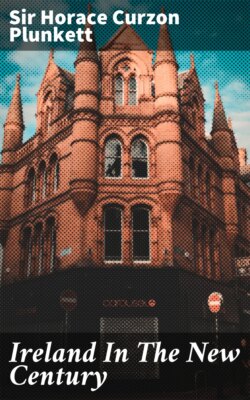Ireland In The New Century

Реклама. ООО «ЛитРес», ИНН: 7719571260.
Оглавление
Sir Horace Curzon Plunkett. Ireland In The New Century
Ireland In The New Century
Table of Contents
I DEDICATE ALL IN THIS BOOK. THAT IS WORTHY OF THE FRIENDSHIP. WITH WHICH HE HONOURED ME, AND OF THE COUNSEL WHICH HE GAVE ME. FOR MY GUIDANCE IN IRISH PUBLIC LIFE
PREFACE
THEORETICAL
THE ENGLISH MISUNDERSTANDING
THE IRISH QUESTION IN IRELAND
THE INFLUENCE OF POLITICS UPON THE IRISH MIND
THE INFLUENCE OF RELIGION UPON SECULAR LIFE IN IRELAND
A PRACTICAL VIEW OF IRISH EDUCATION
THROUGH THOUGHT TO ACTION
PRACTICAL
THE NEW MOVEMENT; ITS FOUNDATION ON SELF-HELP
THE RECESS COMMITTEE
A NEW DEPARTURE IN IRISH ADMINISTRATION
GOVERNMENT WITH THE CONSENT OF THE GOVERNED
PART I
THEORETICAL
CHAPTER I
THE ENGLISH MISUNDERSTANDING
CHAPTER II
THE IRISH QUESTION IN IRELAND
CHAPTER III
THE INFLUENCE OF POLITICS UPON THE IRISH MIND
CHAPTER IV
THE INFLUENCE OF RELIGION UPON SECULAR LIFE IN IRELAND
CHAPTER V
A PRACTICAL VIEW OF IRISH EDUCATION
CHAPTER VI
THROUGH THOUGHT TO ACTION
PART II
PRACTICAL
CHAPTER VII
THE NEW MOVEMENT: ITS FOUNDATION ON SELF-HELP
CHAPTER VIII
THE RECESS COMMITTEE
CHAPTER IX
A NEW DEPARTURE IN IRISH ADMINISTRATION
CHAPTER X
GOVERNMENT WITH THE CONSENT OF THE GOVERNED
INDEX
Отрывок из книги
Sir Horace Curzon Plunkett
Published by Good Press, 2019
.....
The anti-climax to the Gladstone crusade was reached when Lord Rosebery in 1894 took over the premiership from the greatest English advocate of the Irish cause. The position of the new leader was very simple. In effect, he told the Irish Nationalists that the English party he was about to lead had done its best for them. They must now regard themselves as partners in the United Kingdom, with the British as the predominant partner. Until the predominant partner could be brought to take the Irish view of the partnership, the relations between them must remain substantially as they were. And not only must the concession of Home Rule await the conversion of the British electorate, but before the demand could be effectively preferred, another leader must rise up among the Irish; and he, for all Lord Rosebery knew, was at the moment being wheeled in a perambulator. This apparently cynical avowal of the new premier's own attitude towards Home Rule accurately stated the facts of the situation, and fairly reflected the mind of the British electorate, after Irish obstruction had given them an opportunity of studying the bearing of the Irish Question on English politics.
If the logic of events was thus making for the removal of Home Rule from the region of practical politics in England, an even more momentous change was taking place in Ireland. Whilst the Home Rule controversy was at its height in the 'eighties and early 'nineties, some Irish grievances were incidentally dealt with—not always under the best impulses or in the best way. The concentration of all the available thought and energy of Irish public men upon an appeal to the passions and prejudices of English parties had led to the further postponement of all Irish endeavour to deal rationally and practically with her own problems at home. But during the welter of contention which prevailed after the fall of Parnell, there grew up in Ireland a wholly new spirit, born of the bitter lesson which was at last being learned. The Irish still clung undaunted to their political ideal, but its pursuit to the exclusion of all other national aims had received a wholesome check. Thought upon the problems of national progress broadened and deepened, in a manner little understood by those who knew Ireland from without, and, indeed, by many of those accounted wise among the observers from within. Was the realisation of a distinctive national existence, many began to ask themselves, to be for ever dependent upon the fortunes of a political campaign? In any scheme of a reconstructed national life to which the Irish would give of their best, there must be distinctiveness—that much every man who is in touch with Irish life is fully aware of—but the question of existence must not be altogether ignored. At the rate the people were leaving the sinking ship, the Irish Question would be settled in the not distant future by the disappearance of the Irish. Had we not better look around and see how other countries with more or less analogous conditions fared? Could we not—Unionists and Nationalists alike—do something towards material progress without abandoning our ideals? Could we not learn something from a study of what our people were doing abroad? One seemed to hear the voice of Bishop Berkeley, the biting pertinence of whose Queries is ever fresh, asking from the grave in which he had been laid to rest nearly a century and a half ago 'whether it would not be more reasonable to mend our state than complain of it; and how far this may be in our own power?'
.....